

5 astuces matérielles pour se simplifier la vie quand on est prof en secondaire ! 6 Tips for Managing the Feedback Workload. We know that giving students feedback works: In his meta-analysis, John Hattie found that it has an effect size of 0.7, which is beyond the “hinge point,” or average effect size, of 0.4—meaning that it has a significant effect on student learning.
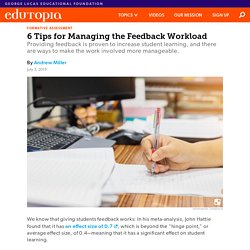
However, giving feedback can be challenging, and it’s certainly a lot of work. We’ve all taken student assignments home over the weekend or stayed late after school grading papers. This may be necessary from time to time, but there are strategies we can use to reduce this workload by working smarter for our students. Reducing the Feedback Workload 1. Developing Teachers’ Research Comprehension – Mr. G Mpls. With all the emphasis on literacy and reading comprehension in schools, it’s quite ironic that we teachers ourselves are not very adept at actually reading and comprehending educational research.

This is illustrative, for three reasons. Research is its own domain with multiple sub-domains. Teachers struggle with the same problem facing younger students in their reading comprehension – we do not have sufficient background knowledge to comprehend educational research. Teach Like a Pirate: Increase Student Engagement, Boost Your Creativity, and Transform Your Life as an Educator by Dave Burgess. Why It's So Important That Teachers Cultivate Their Own Resilience. Teaching Methods for Inspiring the Students of the Future. Shut Up! And Let Me Teach: Ending the Assault on Teacher Autonomy. Why teachers teach but kids don’t learn. 12 Principles Of Modern Learning - 12 Principles Of Modern Learning.
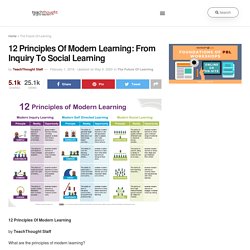
Équilibrer son cours pour s'adapter à chaque élève ✨ #education #enseignement #différenciation. La coopération, c’est politique ! Daniel Pennac : "Ce que je dirais aux professeurs" 18h13 , le 30 mai 2015, modifié à 16h45 , le 20 juin 2017.
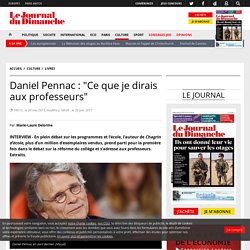
Differentiating Instruction Using Learning Menus. [livre] L’essentiel de la pédagogie. Nous avons ici même parfois égratigné Alain Bentolila, dont nous n’avions pas spécialement apprécié les dernières publications et interventions.
![[livre] L’essentiel de la pédagogie](http://cdn.pearltrees.com/s/pic/th/l-essentiel-de-la-pedagogie-197968006)
[Vidéo] Journée de la laïcité : table ronde académique au lycée international de Noisy-le-Grand (93) 9 Ways to Differentiate Your Whole Group Instruction. Differentiating your instruction can be overwhelming.
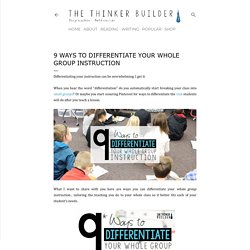
I get it. When you hear the word "differentiation" do you automatically start breaking your class into small groups? Or maybe you start scouring Pinterest for ways to differentiate the task students will do after you teach a lesson. Ten books every teacher should read. Plato’s Republic, Rousseau’s Émile and Dewey’s Democracy and Education – there’s a strong case to be made, as Dennis Hayes has, that these are the only books on education that teachers need to read.

But if I was about to enter the classroom as a teacher for the first time or was looking to improve my practice, I would probably want to read something with more practical advice on what I should be doing and, more importantly, on what I shouldn’t. Much of what happens in a classroom is highly variable and hard to define, but over the last 10 years a wealth of books has sought to draw together evidence from other fields and provide a series of “best bets” on what might have the greatest impact on student learning. Making Failure Harder Work Than Passing. Chemistry seems to inspire a D mentality: A significant number of students just want to pass the class to meet their graduation requirement, and do it with as little effort as possible.
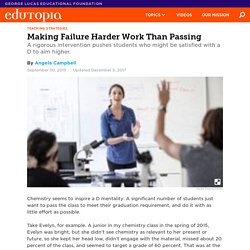
Take Evelyn, for example. A junior in my chemistry class in the spring of 2015, Evelyn was bright, but she didn’t see chemistry as relevant to her present or future, so she kept her head low, didn’t engage with the material, missed about 20 percent of the class, and seemed to target a grade of 60 percent. That was at the beginning of the year. By the end of the term, Evelyn was sitting in the front row, volunteering to demonstrate how to solve problems, and getting frustrated with herself when her final grade in the class was a B. Evelyn’s grade had gone from a 60 percent to an 85 percent, but the real changes that I saw in her were much more rewarding than an improved grade point average—she was engaged in learning, taking risks, and working harder than she had once believed she could.
La confiance à l’épreuve des rencontres parents-professeurs. "Supports à la réflexion pédagogique", 8 fiches, guides pour se poser des questions sur ses pratiques. Framing Difficult Feedback for Parents. A standard approach is the praise sandwich or feedback sandwich, which attempts to sidestep blame, conflict, and hurt feelings by surrounding negative feedback with positive statements. After opening with praise (“Johnny is so energetic”), the teacher brings up a specific critique (“With all that energy, he can become quite disruptive in class”), and closes on a positive note (“But he adds so much to our learning community”).
While this tactic remains popular, it’s not always effective: Since people tend to remember the first and last things they hear, they focus on the praise at the ends and not the critique in the middle. The sandwich delivery softens the message and doesn’t necessarily drive it home. A Different Approach to Difficult Feedback. How To Talk With Kids About Terrible Things. Sample Report Card Comments for Any Teaching Situation. Effective parent-teacher communication is a cornerstone to effective parent involvement.
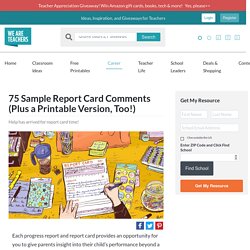
Each progress report and report card provides an opportunity for teachers to give parents insight into their child’s performance beyond a letter or numerical grade for conduct or academics. Parents want to know how their child is doing, but they also want to know that their teacher gets their child. How Teachers Can See Students' Identities As Learning Strengths. George Sirrakos’ first teaching experience was in the Bronx, and although he grew up in New York City, he had rarely been to the neighborhoods his students called home.
As a white, male teacher, his experience growing up as a New Yorker did not mirror those of his students, and he wanted to try out some of the reality pedagogy techniques he learned in Dr. Emdin’s class. Sirrakos said he first tried a core practice Emdin calls “co-generative dialogue,” where teachers select students who represent a variety of classroom experiences to give feedback on the class. The teacher actively listens and solicits solutions students believe would help them. Three Tips for Teaching Generation Z. Society has some less-than-desirable thing to say about our students.
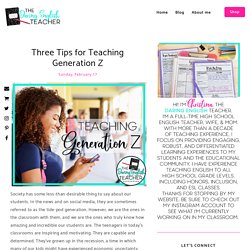
In the news and on social media, they are sometimes referred to as the tide-pod generation. However, we are the ones in the classroom with them, and we are the ones who truly know how amazing and incredible our students are. The teenagers in today’s classrooms are inspiring and motivating. They are capable and determined. They’ve grown up in the recession, a time in which many of our kids might have experienced economic uncertainty. Petit lexique de l’Enseignement Explicite. Bibliographie. 17 Tips for New Teachers and Their Mentors. There’s no doubt that most new teachers benefit greatly from having a more experienced teacher guide them as they venture into this demanding career. WeAreTeachers HELPLINE Heather T. recently started a new position coordinating the new teachers and their mentors in her building. She wrote in for advice about how to best help them. “I have the privilege of co-leading the new teachers and their mentors this year.
New Teachers: Classroom-Management Fundamentals. Tips, Advice, and Strategies New Teachers: Classroom Management Essentials: Four easy-to-implement strategies you can put to use today to help foster learning in the classroom. (Edutopia, 2017) 19 Big and Small Classroom Management Strategies: Read about a few big strategies to keep in mind, and explore over a dozen quick interventions that can help keep students focused on learning. (Edutopia, 2016) Classroom-Management: Important Big-Picture Questions: Before getting into the minutiae, consider how you organize your space, what learning looks like, and how you’re building relationships with families.
(Edutopia, 2015) 5 Quick Classroom-Management Tips for Novice Teachers: Straightforward classroom-management strategies that you can use immediately. (Edutopia, 2015) 5 Tips for Making Group Work Manageable: Encourage small-group effectiveness by clarifying the task, focusing on production, modeling successful behavior, building community, and monitoring progress, time, and noise. Thriving in Your First Years as a Teacher. It is a universal truth that early career teachers are overwhelmed. Between classroom management issues, lesson plans, and grading, we’re oftentimes drowning. With all the pressure to simply survive our first few years of teaching, doing anything else in the name of improvement may seem impossible. Premier poste : dix conseils pour entrer dans le métier.
Dix conseils pour entrer dans le métier : • Restez vous-même. • Gardez une vie culturelle personnelle. • Ce que vous enseignez vous passionne ? Conseils pratiques de rentrée pour les nouveaux professeurs de lettres. Le tout récent professeur certifié ou agrégé de lettres, encore suspendu à la désignation du futur établissement d’affectation pour son année de stage, n’en reste pas moins, la fin août approchant, gagné par des interrogations justifiées en début de carrière. Aussi apparaît-il important de donner quelques conseils pratiques afin d’appréhender plus sereinement la rentrée prochaine. Éloge du décentrement. Conseils de rentrée aux professeurs stagiaires de lettres. Le présent document ne prétend pas délivrer une parole absolue susceptible de résoudre tous les problèmes posés au sujet de la première rentrée d’un enseignant.
À visée synthétique et pragmatique, il se donne simplement comme objectif de répondre aux premières questions pratiques que chaque professeur de lettres débutant dans le métier en collège et en lycée est en droit de formuler. Questions de positionnement.